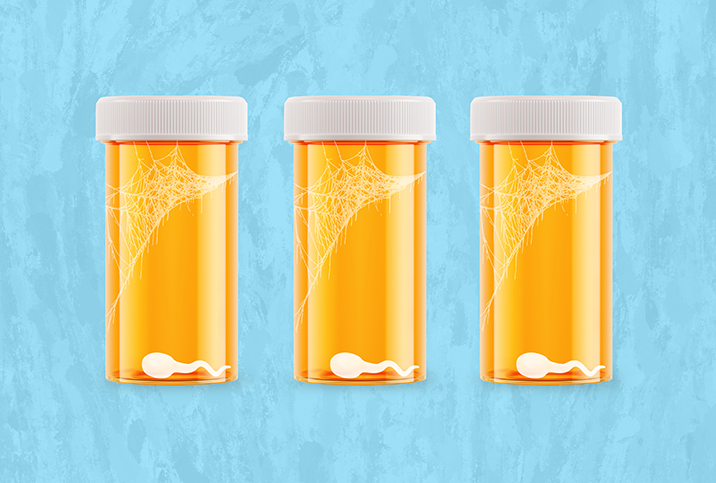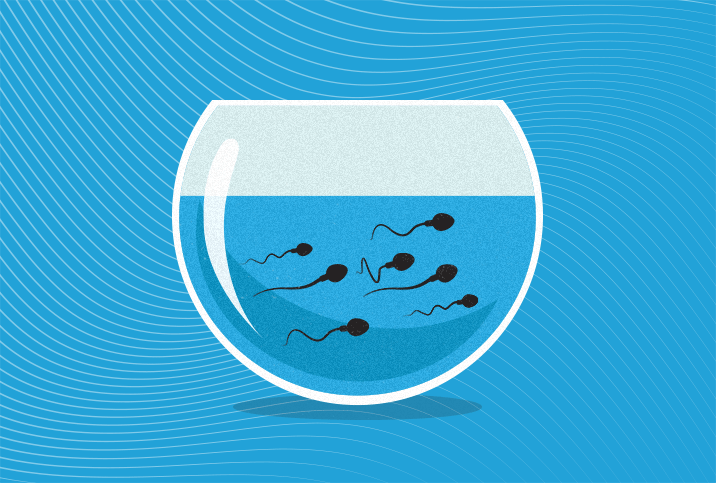Prescription Drugs and Links to Male Infertility

National Infertility Awareness Month 2023 (NIAW) runs from April 23 to 28. In honor of the federally recognized movement—which seeks to increase understanding and fight the stigma associated with infertility—we're highlighting a common cause of male infertility: certain prescription drugs.
Certain types of prescription medications have been linked to male infertility. The big hitters include hormone therapies, chemotherapy drugs and opioids.
Many medications associated with male infertility have a negative impact on sperm production, while others impact the function of the sperm, including its ability to move and fertilize the egg.
"Unfortunately, a lot of primary care doctors that prescribe these drugs aren't always up to date or they're not as familiar with the fertility implications of some of these medications," said T. Mike Hsieh, M.D., a urologist who specializes in male fertility at UC San Diego Health (University of California). "Sometimes [men] do have to seek help from a fertility specialist to help them navigate some of these systems."
Anyone who is actively trying to conceive should review their medications with their prescribers, Hsieh recommended.
"Unless there's a very strong association of a medication having a negative effect on sperm health, it's hard to counsel patients about the negative effects of various medications," said Bobby Najari, M.D., a urologist and the director of the male infertility program at NYU Langone Health in New York City.
'Like giving a man a birth control pill'
When Hsieh reviews a patient's list of medications, the ones that jump out at him are hormonal drugs and treatments such as testosterone replacement therapy (TRT) or long-term steroid use, because these affect the production and function of sperm.
"Getting testosterone replacement therapy is like giving a man a birth control pill," Hsieh said. "If you're taking testosterone for athletic performance enhancement or other lifestyle reasons, that is definitely a big no-no."
Najari believes some men have a false impression they can stop TRT and sperm production will come back to baseline, but that's not always the case.
"There are some men who have potentially permanent negative effects on sperm production from being on testosterone," he said. "And even if they do have a rebound in their sperm production, it can be slow; it can take a year or two. That's potentially two wasted years for a couple who, if there are female factors additionally, it's really a tough situation to be in."
Finasteride, which is often used to treat male pattern hair loss or an enlarged prostate, is another drug that concerns fertility specialists. This 5-alpha-reductase inhibitor acts on the male reproductive pathways, blunting the effect of testosterone by preventing its conversion into dihydrotestosterone, the more potent form of testosterone.
This action has a negative effect on sperm production.
"Many of these medications can fall into a gray zone where there are plenty of men who take the medication and don't have a negative effect on their sperm production," Najari explained. "I think one of the challenges is everyone is different, everyone has their own chemistry, and so what is totally fine in one person might not be in a different person."
Chemotherapy, opioids and other drugs
Chemotherapy drugs, particularly cisplatin, can have a detrimental and potentially permanent effect on sperm production, Najari said. These drugs kill dividing cells, directly impacting sperm production and essentially sterilizing a man.
Najari said if a man wants children and needs chemotherapy, he should be counseled on sperm banking, the process of freezing and storing sperm.
Similarly, long-term use of opioids, such as OxyContin and Vicodin, to treat chronic pain can shut down the production of testosterone and sperm, the two primary functions of the testicles.
"Besides their addictive nature, [opioids] suppress follicle-stimulating hormone and luteinizing hormone," Najari said.
Further complications could result from calcium channel blockers, which are commonly prescribed to treat high blood pressure. These drugs can affect how the sperm fertilizes the egg.
"That's more on the functional side," Hsieh explained. "If the sperm cannot penetrate the egg, then that can cause problems for fertility."
Najari pointed out, however, that there is conflicting data on calcium channel blockers and infertility.
Antidepressants and psychiatric medications can affect the delivery of sperm, too, as they may cause erectile dysfunction (ED) or delayed ejaculation. Antidepressants may also lower testosterone levels.
More complications could lie in the use of nitrofurantoin, a commonly prescribed antibiotic used to treat urinary tract infections, which may have a negative effect on sperm production.
Not uncommon but not the rule
Najari and Hsieh both said conversations about medications that could cause infertility occur with less than half of their patients, largely because many men of reproductive age generally don't take many prescription drugs; either they're healthy or they avoid seeing a doctor.
However, Najari said he thinks there's a trend pointing to these conversations happening more often, partly because doctors are seeing a higher number of older men trying to reproduce for the first time.
"As a society, we are starting families later than we used to, and so there are fathers or potential fathers who are older than in the past," Najari said. "As we get older, we're more likely to be taking some of these medications."
Hsieh said most of his patients have infertility issues that stem from not taking care of themselves and not getting routine healthcare screenings.
"They have other comorbidities that are leading to their body not being healthy and not producing sperm properly," he said.
Do the research
If you're a man having difficulty in your goal to conceive, it's critical to be screened for medications that could be impacting your fertility.
"We want to make sure they get off these medications because a lot of these are reversible," Hsieh said.
One helpful resource is the Food and Drug Administration (FDA) label for medications. The online search site has a section about each specific drug's impact on reproduction.
"It can be helpful to pull that and have a discussion with their doctor on whether or not their doctor thinks the evidence is strong enough to change the medication," Najari said of patients experiencing infertility complications. "It's a tough situation because there are so many different medications and there's relatively scant evidence on the impact of these medications on fertility. There's no way for one person to know all of the potential medications and their potential impact, so it often is a drug-by-drug research process."


















